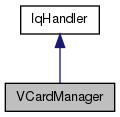#include <vcardmanager.h>

Public Member Functions | |
| VCardManager (ClientBase *parent) | |
| virtual | ~VCardManager () |
| void | fetchVCard (const JID &jid, VCardHandler *vch) |
| void | storeVCard (VCard *vcard, VCardHandler *vch) |
| void | cancelVCardOperations (VCardHandler *vch) |
| virtual bool | handleIq (const IQ &iq) |
| virtual void | handleIqID (const IQ &iq, int context) |
 Public Member Functions inherited from IqHandler Public Member Functions inherited from IqHandler | |
| virtual | ~IqHandler () |
Detailed Description
A VCardManager can be used to fetch an entities VCard as well as for setting one's own VCard.
You need only one VCardManager per Client/ClientBase.
Fetching a VCard
Create a VCardManager and have a VCardHandler ready. Then simply call fetchVCard() and wait for the result.
Storing one's own VCard
- Note
- Some, if not many, servers do not implement support for all the fields specified in XEP-0054. Therefore it is possible that you cannot retrieve fields you stored previously.
Similar to the above, you need a VCardManager and a VCardHandler. Then construct your VCard and call storeVCard().
This implementation supports more than one address, address label, email address and telephone number.
- Note
- Currently, this implementation lacks support for the following fields: AGENT, CATEGORIES, SOUND, KEY
When cleaning up, delete your VCardManager instance before deleting the Client/ClientBase instance.
- Since
- 0.8
Definition at line 100 of file vcardmanager.h.
Constructor & Destructor Documentation
| VCardManager | ( | ClientBase * | parent | ) |
Constructor.
- Parameters
-
parent The ClientBase object to use for communication.
Definition at line 24 of file vcardmanager.cpp.
|
virtual |
Virtual destructor.
Definition at line 35 of file vcardmanager.cpp.
Member Function Documentation
| void cancelVCardOperations | ( | VCardHandler * | vch | ) |
Use this function, e.g. from your VCardHandler-derived class's dtor, to cancel any outstanding operations (fetchVCard(), storeVCard()). Calling this function even if no operations are pending is just fine.
- Parameters
-
vch The VCardHandler to remove from any queues.
- Since
- 0.9
Definition at line 62 of file vcardmanager.cpp.
| void fetchVCard | ( | const JID & | jid, |
| VCardHandler * | vch | ||
| ) |
Use this function to fetch the VCard of a remote entity or yourself. The result will be announced by calling handleVCard() the VCardHandler.
- Parameters
-
jid The entity's JID. Should be a bare JID unless you want to fetch the VCard of, e.g., a MUC item. vch The VCardHandler that will receive the result of the VCard fetch.
Definition at line 45 of file vcardmanager.cpp.
|
inlinevirtual |
Reimplement this function if you want to be notified about incoming IQs.
- Parameters
-
iq The complete IQ stanza.
- Returns
- Indicates whether a request of type 'get' or 'set' has been handled. This includes the obligatory 'result' answer. If you return false, a 'error' will be sent.
- Since
- 1.0
Implements IqHandler.
Definition at line 142 of file vcardmanager.h.
|
virtual |
Reimplement this function if you want to be notified about incoming IQs with a specific value of the id attribute. You have to enable tracking of those IDs using Client::trackID(). This is usually useful for IDs that generate a positive reply, i.e. <iq type='result' id='reg'/> where a namespace filter wouldn't work.
- Parameters
-
iq The complete IQ stanza. context A value to restore context, stored with ClientBase::trackID().
- Note
- Only IQ stanzas of type 'result' or 'error' can arrive here.
- Since
- 1.0
Implements IqHandler.
Definition at line 88 of file vcardmanager.cpp.
| void storeVCard | ( | VCard * | vcard, |
| VCardHandler * | vch | ||
| ) |
Use this function to store or update your own VCard on the server. Remember to always send a full VCard, not a delta of changes. If you, for any reason, pass a foreign VCard to this function, your own will be overwritten.
- Parameters
-
vcard Your VCard to store. vch The VCardHandler that will receive the result of the VCard store.
Definition at line 75 of file vcardmanager.cpp.
The documentation for this class was generated from the following files:
 1.8.1.2
1.8.1.2